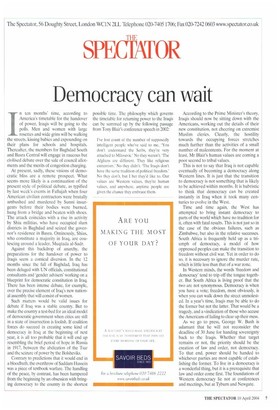Democracy can wait
In ten months' time, according to America's timetable for the handover of power, Iraqis will be going to the polls. Men and women with large rosettes and wide grins will be walking the streets, kissing babies and expounding on their plans for schools and hospitals. Thereafter, the members for Baghdad South and Basra Central will engage in raucous but civilised debate over the sale of council allotments and the merits of congestion charging.
At present, sadly, these visions of democratic bliss are a remote prospect. What seems more likely is a continuation of the present style of political debate, as typified by last week's events in Fallujah when four American civilian contractors were brutally ambushed and murdered by Sunni insurgents before their bodies were burned, hung from a bridge and beaten with shoes. The attack coincides with a rise in activity by Shia militias, who have occupied slum districts in Baghdad and seized the governor's residence in Basra. Ominously, Shias, who constitute a majority in Iraq, are coalescing around a leader, Muqtada al-Sadr.
Against this backdrop of anarchy, the preparations for the handover of power to Iraqis seem a comical diversion. In the 12 months since the fall of Baghdad, Iraq has been deluged with UN officials, constitutional consultants and 'gender advisers' working on a blueprint for democratic constitution in Iraq. There has been intense debate, for example, over the precise element of Iraq's new national assembly that will consist of women.
Such matters would be valid issues for debate if Iraq was a stable country. But to make the country a test-bed for an ideal model of democratic government when cities are still in a state of insurrection is foolish. If coalition forces do succeed in creating some kind of democracy in Iraq at the beginning of next year, it is all too probable that it will end up resembling the brief period of hope in Russia in 1917, between the abdication of the Tsar and the seizure of power by the Bolsheviks.
Contrary to predictions that it would end in a bloodbath, the overthrow of Saddam Hussein was a piece of textbook warfare. The handling of the peace, by contrast, has been hampered from the beginning by an obsession with bringing democracy to the country in the shortest possible time. The philosophy which governs the timetable for returning power to the Iraqis can be summed up by the following passage from Tony Blair's conference speech in 2002:
I've lost count of the number of supposedly intelligent people who've said to me, 'You don't understand the Serbs, they're very attached to Milosevic.' No they weren't. 'The Afghans are different. They like religious extremism.' No they didn't. 'The Iraqis don't have the same tradition of political freedom.' No they don't, but I bet they'd like to. Our values are Western values, they're human values, and anywhere, anytime people are given the chance they embrace them.
According to the Prime Minister's theory, Iraqis should now be sitting down with the Americans, working out the details of their new constitution, not cheering on extremist Muslim clerics. Clearly, the hostility towards the occupying forces stretches much further than the activities of a small number of malcontents. For the moment at least, Mr Blair's human values are coming a poor second to tribal values.
This is not to say that Iraq is not capable eventually of becoming a democracy along Western lines. It is just that the transition to democracy is not something that is likely to be achieved within months. It is hubristic to think that democracy can be created instantly in Iraq when it took many centuries to evolve in the West.
Time and time again, the West has attempted to bring instant democracy to parts of the world which have no tradition for it, often with fatal results. This is not just so in the case of the obvious failures, such as Zimbabwe, but also in the relative successes. South Africa is frequently held up as a triumph of democracy, a model of how oppressed peoples can make the transition to freedom without civil war. Yet in order to do so, it is necessary to ignore the murder rate, which is little less than that of a war zone.
In Western minds, the words 'freedom and democracy' tend to trip off the tongue together. But South Africa is living proof that the two are not synonymous. Democracy is when you have a vote; freedom, most obviously, is when you can walk down the street unmolested. In a year's time, Iraqis may be able to do the former but not the latter. That would be a tragedy, and a vindication of those who accuse the Americans of failing to clear up their mess.
As we go to press, George W. Bush is adamant that he will not reconsider the deadline of 30 June for handing sovereignty back to the Iraqis. Whether that target remains or not, the priority should be the creation of law and order, not democracy. To that end, power should be handed to whichever parties are most capable of establishing the former. To live in a democracy is a wonderful thing, but it is a prerequisite that law and order come first. The foundations of Western democracy lie not at conferences and meetings, but at Tyburn and Newgate.


































































 Previous page
Previous page